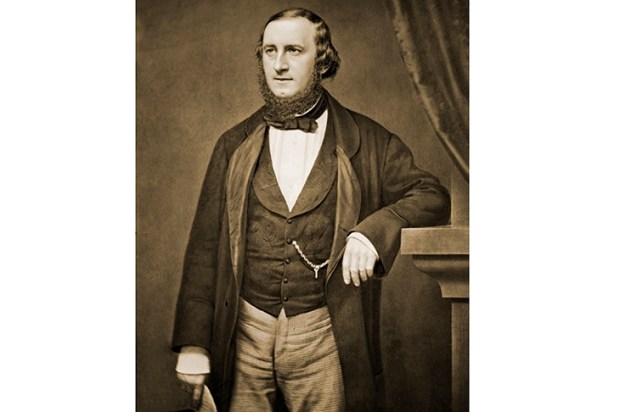My favourite comment about the Scottish referendum came from the eminent comedian and novelist David Baddiel. ‘What if Yes wins, but due to a typographical error, the prog-rock band gets in and Jon Anderson becomes First Minister?’ You probably had to be there to find this funny, and in this case ‘there’ is the early 1970s.
Having been there myself, I too remember Yes as the most intrinsically amusing of progressive bands, along with Emerson, Lake and Palmer. Genesis were quite funny in their early days, when Peter Gabriel dressed up as a flower. Pink Floyd weren’t funny, although Roger Waters is. The Beatles aren’t funny any more, but the Rolling Stones are as hilarious as ever. Many prominent 1980s acts — U2, Duran Duran, Spandau Ballet — were sidesplitting. Queen were consistently chortlesome, but they knew it and didn’t mind at all. Oasis never had the smallest idea how funny they were, which only made them funnier. Coldplay aren’t funny, although Chris Martin is. Radiohead get funnier and funnier as the years go by. Mumford & Sons show considerable potential in this regard, if not in many others.

The bizarre thing is, Yes are still going. After 45 years and more line-up changes than the England football team — Rick Wakeman alone has left and rejoined more times than anyone can remember — these grizzled sexagenarians are still touring and, even more miraculously, recording new material. I last wrote about them a decade ago, after discovering their 2001 album Magnification. Wakeman had left again, and instead of finding another keyboard player, the ancient rump of the band (Jon Anderson, vocals; Steve Howe, guitar; Chris Squire, bass; Alan White, drums) recorded their next album with a 60-piece orchestra. It was a revelation. There was too much of it, as there often is. When a Yes song doesn’t work, it takes its time not to work. Whole albums have been known to pass without a single identifiable melody or interesting idea. But on Magnification the band seemed not just refreshed but inspired to write some of their strongest songs in decades. Even some of Jon Anderson’s lyrics made sense.
Nothing kills a career, though, like a terrific album that no one buys. What else can you do? What else do you have to offer? After Magnification stiffed, Yes mounted a slightly desperate 35th anniversary tour (with Wakeman, who had come back again), and then went ‘on hiatus’: they didn’t quite split up, because that would involve accountants. Anderson, their de facto leader, had health problems and didn’t see the point of recording new material if no one wanted to hear it. But the other old geezers sensed that time was running out, so they gave Anderson the boot and recruited a stocky middle-aged Canadian called Benoît David, who among other jobs (possibly involving grouting) sang in a Yes tribute band. Imagine the Bootleg Beatles getting a call from Paul McCartney wondering what they were up to this weekend.
The resulting album, 2011’s Fly From Here, was produced by Trevor Horn, featured his old Buggles chum Geoff Downes on keyboards (replacing Wakeman, who had left again), and was every bit as good as Magnification, although quite different. Indeed, it may be the most texturally varied of all Yes’s albums, full of Horn’s smart production ideas, and almost pop-melodic in places. Many of Yes’s more hardcore fans hated it. I bought it this summer and have played it non-stop.
They are not wearing well, though. Some men, as they age, become huge and slab-like, with vast craggy faces and ears the size of rucksacks. Others seem to shrink into themselves, as though marinated in vinegar. Yes’s remaining members, some huge, some wizened, look as though they are only about two or three years from shouting at pedestrians. But still they go on. This year they released another new album, Heaven & Earth, produced by Roy Thomas Baker and featuring another new singer, and you know what? It’s awful. You listen and wonder: how can they not know? But that’s the charm of the band, and probably the secret to their longevity. They do it because they like doing it, and if other people happen to like it as well, that’s a bonus. And if it all goes pear-shaped on their latest endless US tour, they know that, on the other side of the world, bag packed and ready to go, Rick Wakeman is waiting for the call.
Got something to add? Join the discussion and comment below.
Get 10 issues for just $10
Subscribe to The Spectator Australia today for the next 10 magazine issues, plus full online access, for just $10.
You might disagree with half of it, but you’ll enjoy reading all of it. Try your first month for free, then just $2 a week for the remainder of your first year.













Comments
Don't miss out
Join the conversation with other Spectator Australia readers. Subscribe to leave a comment.
SUBSCRIBEAlready a subscriber? Log in